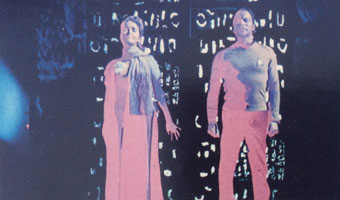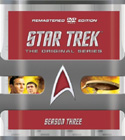
STAR TREK:
- The Original Series (TOS)
- The Animated Series
- The Movies
- The Next Generation (TNG)
- Deep Space Nine (DS9)
- Voyager
- Enterprise

THE ORIGINAL SERIES:
- Season One
- Season Two
- Season Three
- "Season Four"
Season Three:
-56: "Spectre of the Gun"
-57: "Elaan of Troyius"
-58: "The Paradise Syndrome"
-63: "The Empath"
-65: "For the World is Hollow
& I Have Touched the Sky"
-78: "All Our Yesterdays"
-79: "Turnabout Intruder"
-Season 3 Rankings

SCIENCE FICTION:
- Doctor Who
- Sliders
- The Matrix

- Main Index
- Site Map
|
Star Trek
Season 3 (1968-1969)
|
|
|

Turnabout Intruder
(Star Trek story #79 in production order)
story by Gene Roddenberry
teleplay by Arthur H. Singer
Here's a very decent, well-functioning episode concerning a sci-fi body-swap and subsequent
drama with the command of the Enterprise at stake - a drama that gives most of the
regulars good things to do and some meatier-than-usual scenes to play. All good.
But it seems that most people come away from the episode believing that it contradicted
most of the rest of the Star Trek franchise on the point of whether the Starfleet organization
allows women to become captains of vessels in the fleet.
|
|

|
I wondered though, and challenged the assumption. Did the episode actually say that?
How did most of us come to believe that this episode was just such a bad apple in an
otherwise good basket?
I began with a hypothesis centered around the character of Dr. Janice Lester.
If Starfleet denied her the rank of captain, or indeed one or more of the promotions
required to precede becoming captain, and her mind searched around for the reason,
what might this particular character conclude that reason was? The episode
paints a very clear picture that she hates womanhood, believes women are weaker,
and desperately wishes she was something more powerful. It's a common failing of
many men and women when looking for reasons for their disappointments, to latch
onto and blame factors of race or gender or weight or any number of things which
may worry them, without coming anywhere close to the real reason the other party
may have for turning them down.
Could it be that, in this
episode as much as anywhere else, Starfleet still judged eligibility for captaincy
on merit and skill, but Lester and possibly also her cohort Dr. Coleman
believed it was all about shutting women out of the captain's club,
and believed it so much more loudly that audience members commonly mistake
their belief for truth? What if we looked at the things Lester and her cohort say
completely separately from what our regular Starfleet characters say? Where is the real
truth of Starfleet's position, in this episode?
Well, closer examination reveals there are three key moments in the episode that need
to be looked at. The first in chronological sequence turns out to be the most important,
and the most confusing. It comes in the teaser, and it is a conversation between
Kirk and Lester. It is confusing because, due to their prior relationship, they have developed
a bit of a shorthand in how they communicate ideas, and it is a bit of a continuation of
prior debates they have had. We the audience don't get to hear how this old debate started,
or how the issues were introduced into it and clarified.
|
Lester: I hoped I wouldn't see you again.
Kirk: I don't blame you.
Lester: The year we were together at Starfleet is the only time in my life I was alive.
Kirk: I never stopped you from going on with your space work.
Lester: Your world of starship captains doesn't admit women. It isn't fair.
Kirk: No it isn't. And you punished and tortured me because of it.
Lester: I loved you. We could have roamed among the stars.
Kirk: We'd have killed each other.
Lester: It might have been better.
| |
A lot is crammed into this exchange - in particular, discussion of romantic relations
and career are fused to the point where it is difficult to tell where one stops and the other starts.
Lester's first line turns out to be lie - it turns out that she's actually planned quite carefully
to be alone with Kirk in the room with the swap-eroo machine on Camus II.
Her next two lines both appear to be primarily about career... but I think it's the second
of those that we need to be most careful about, because Kirk agrees with her.
Are they talking about the same thing?
This is the critical sentence: "Your world of starship captains doesn't admit women."
Since Lester spends most of the rest of the episode trying to be captain,
we can easily think this is all about her career as well, that it in fact states Starfleet policy.
BUT, notice how the rest of their exchange is focused on their personal relationship
after this point. It might be well to begin at the end of this dialogue and work backwards
to find its true meaning. Lester clearly has a lot of regret over the possibilities for their
relationship that did not come to fruition. What was that relationship to be?
If she had expected that they would both become captains, surely they would be assigned to
separate ships, on separate missions, only seeing each other on odd occasion afterwards.
But Lester says "I loved you. We could have roamed the stars." and Kirk replies,
"We'd have killed each other." implying that the possibility they looked at then was
to serve on the same ship... and at what rank? Surely not both of them being Captain?
Maybe the big pivot from career to romance in their dialogue comes one line earlier,
and audience members are almost never prepared for it.
What if the line "Your world of starship captains doesn't admit women" isn't about
career at all, but about relationships... In other words, Lester isn't trying to comment
on Starfleet policy, but Kirk's romantic policy. I'm reminded of much
of what Kirk revealed back in
"The Naked Time" (TOS season 1),
how the duties of a captain prevented him from finding time for permanent romance,
and particularly with anyone under his command.
Emphasis on "Your world... doesn't admit women."
Perhaps it's not about Starfleet preventing Lester from being captain,
but about Kirk preventing a relationship with Lester because he is (or intended to become) a captain.
Food for thought. In fact, the important point here is not even so much
what Dr. Lester means when she says this pivotal line,
but what Kirk thinks she means and subsequently agrees with.
Perhaps he only heard "Your world..." before his mind went guiltily to his own perceived faults
rather than those of Starfleet.
After working that out for myself and writing this up, I now see that the Okudas' DVD text commentary
has put an abbreviation of a similar idea at that very spot during the episode,
regarding that crucial line,
so it seems there have been many more fans on-the-ball regarding this point than I expected.
It's good to see.
Well, for the bulk of this episode, actress Sandra Smith gets to play Captain Kirk,
while William Shatner gets to have fun playing an increasingly unhinged Dr. Janice Lester.
And the episode proceeds with a lot of solid character material for everyone involved.
One of my favourite scenes takes place as Scotty and McCoy meet in the corridor
and have a very in-depth conversation about their concerns. This is something that doesn't
happen so often between these two particular characters, so I do relish this moment
in this episode. But, I'm getting a bit ahead of myself....
The second of the three bits of dialogue to look at closely comes when Kirk in Sandra Smith's body
takes the stand to testify at Spock's court-martial, and we get this bit:
|
Lester in Shatner: "Can you, can you tell me why, uh,
Dr. Janice Lester would agree to this... ludicrous exchange?"
Kirk in Smith: "Yes. To get the power she craved.
To attain a position she doesn't merit by temperament or training.
And most of all, she wanted to murder James Kirk, the man who once loved her.
But her intense hatred of her own womanhood made life with her impossible."
| |
There's a lot to be taken from this.
Firstly, Kirk's reasons for ending the relationship stemmed primarily from a large
existential issue in her character, and not so much anything else.
More importantly, he seems to be echoing sound Starfleet policy here when he says
that she does not merit the position of captain "by temperament or training",
which suggests that Starfleet is willing to have women serve as captain
when they meet the right criteria, as you would expect in a fair meritocracy.
It's plain to me that Lester has a big inferiority complex that would make her
much less than ideal as a captain. And the crew of the Enterprise sense the change
in leadership in fairly organic fashion.
Meanwhile, Lester in Shatner suggests that Spock is attempting to gain command for himself
because surely Starfleet command would not allow Kirk to be in command if he was proven
to be trapped in... and she can't quite finish it, but we know what she means... in a woman's body.
Are any of our Starfleet characters buying that logic? How ludicrous do they find it?
Well, they all keep respectfully quiet in the courtroom, looking astonished at the behaviour
Shatner is displaying, but the audience is left to guess at what they are thinking or believing.
The third bit of dialogue to look at, is really more because other people flag it up.
It never really stuck out as anything special to me. It's the very last line of the show:
|
Kirk: Her life could've been as rich as any woman's... if only... if only...
| |
Yeah, so? Nothing wrong with that one.
IF Starfleet policy indeed accepts women as captains in this episode as much as in others,
she could have been a captain like anyone else, a wife like any other woman,
had any kind of life. But it's good and key that he says "as rich as any woman's",
firstly because Lester's biggest issue, in Kirk's mind at least,
is her existential battle with being female.
Also, I'll give him extra slack because he's just come out of a nasty court confrontation,
and it's a good habit in court to insist on using the words "man" and "woman"
and never "person". That's a difference that can change jurisdictions and maintain
certain rights and freedoms under the law. Get comfortable with using the terms "man" and "woman",
so they pop out automatically when in court.
Adding to our enjoyment, some other recurring characters and/or actors to watch out for include
actress Barbara Baldavin, who previously played Angela Martine in a gold uniform in
"Balance of Terror" (story no. 9) and
"Shore Leave" (story no. 17). Here she is now in a red uniform,
taking over Uhura's station on the bridge for the episode
and acting as court clerk in the court-martial scenes.
Lester in Shatner calls her Lt. Lisa at one point,
indicating she may have finally gotten married and changed her surname,
if indeed Lester got the name right.
We also see actor David L. Ross once more playing a red shirt security guard in this one,
and having a few lines. Ross's character Lt. Galloway bought the farm in the episode
"The Omega Glory" at the end of last season,
and has apparently come back to life again as red shirts sometimes do. Nudge nudge, wink wink.
In conclusion, I have to say there really isn't a clear cut case for this episode to be
an exception to Starfleet's usual policy of allowing women to be captains. It's easily
implied, but never properly stated anywhere. As I like the rest of the episode quite a bit,
and would rate it as one of the better ones of original Trek's third season, I'm prepared
to go with the notion that it's only in Lester's head that Starfleet or Kirk or anyone
might discriminate against her for being a woman. I don't even think her cohort
Dr. Coleman agrees with her on that idea. She creates her own problem... and the drama is on.
That's my prefered take on events as I watch. May your viewing be as pleasant.
Rankings:
Best Story:
- The Enterprise Incident (Good guys can beam as much as they want,
villains not? No shields on enemy vessel to prevent it?
Otherwise a very good ep, with powerful draw.)
- Day of the Dove (excellent episode, though could have used more footage
of triumphant cheer, resolution and aftermath)
- The Cloud Minders (A rare good one that isn't much confined to
the Enterprise sets. Lots of sci-fi/social complexities developed
for this one, and an adventurous odyssey as well.)
- Is There In Truth No Beauty? (Very rich emotional territory
to explore, but short on adventure draw or production excitement)
- Elaan of Troyius
- The Tholian Web (McCoy's antagonism a bit over the top,
but good use is made of this, and the episode is good)
- Let That Be Your Last Battlefield (very memorable premise and
destruct sequence; good dialogue and acting. Definitely
limited by low budget though. But one of S3's better ones.)
- Wink of an Eye (pretty good overall, but the last act flags.
Why keep the solution secret and not help the Scalosians?)
- All Our Yesterdays
- The Mark of Gideon (has surprising heart, but didn't need overt romance.
More concluding drama might have made it more highly memorable.)
- Turnabout Intruder (very unique premise, and some very good scenes
amongst the crew. Perhaps some aspects clumsily handled,
but still pretty good overall.)
- The Paradise Syndrome
(Love the obelisk/deflector/asteroid plot
and shipside drama, the paradise/amnesia concept,
the Native American / Preserver cultural bits.
But why did love and happiness need to be expressed with
what the 60's reset-button episode format couldn't handle:
marriage and pregnancy? Worse, the marriages are fixed
instead of free, and the jealous ex-fiancé angle cliché
and unsatisfying. This drags the ep down. But overall,
it's a good one for S3.)
- The Lights of Zetar (Ah, yes. The belching women...)
- Requiem for Methuselah (has a nice literary sci-fi feel
and atmosphere, and seemed headed for a high rank.
Bizarrely the regulars are very unlike themselves
in the end - Only Spock can decipher all the emotional blows,
McCoy then treats him as if he's an idiot on the subject.
Kirk is out of control and just weird. What the hell?)
- The Savage Curtain (healthy points for the rock creature and
its planet, also for introducing Surak and Kahless to the show.
But it loses many points for forcing a very staged and non-sci-fi
conflict that can say very little of importance about humanoid nature.)
- Spectre of the Gun
(a powerful ending and good main Trekkian mission,
but it spends a lot of time off-point, and pointlessly
carts in Coon's reverse instinct... again.
Probably fewer good scenes/moments than "Spock's Brain")
- The Way to Eden (much merit to its main point, some good
philosophical scenes, and Chekov's best subplot ever.
Mostly, it's some bad songs and corny imagery pulling this one down.)
- For the World is Hollow, and I Have Touched the Sky
(decent episode, very rich setting and background,
struggling to find a worthy drama that makes sense)
- That Which Survives (very good plot, background, & environment,
but what's with all the obtuse dialogue? It sticks out
like a sore thumb, drags the episode down, and leaves us
further wondering what this episode wanted to be all about...)
- Spock's Brain (the premise stretches credulity,
but the plot remains dynamic and keeps interest high
scene for scene. Good exploration of star system's
societal backdrop)
- And the Children Shall Lead (slow in places, and
sometimes questionable acting required...
but not bad overall; some good ideas)
- The Empath
(easily the least entertaining season three story
to this point in the production chronology)
- Whom Gods Destroy (another senseless hour-long capture/escape routine)
- Plato's Stepchildren (one long boring capture/escape routine,
filled with silly acting and moronic posturing.
Not my idea of fulfilling entertainment.)
Best Music:
- Fred Steiner: Elaan of Troyius
- Gerald Fried: The Paradise Syndrome
- Jerry Fielding: Spectre of the Gun
- George Duning: Is There In Truth No Beauty?
- Alexander Courage: The Enterprise Incident
- Fred Steiner: Spock's Brain
- Fred Steiner - S1 tracked for The Tholian Web (Charlie X)
- George Duning: The Empath (music is nice, but why didn't they
track this episode with In Truth No Beauty and other music,
and commission an original score for a more exciting episode?)
- Ivan Ditmars: Requiem for Methuselah "Pseudo Brahms" on piano
- William Pitman: The Way to Eden "Far Out Jam"
- Alexander Courage: Plato's Stepchildren (ditto,
why not score a better episode and track this stinker?)
- George Duning: And the Children Shall Lead
- Heinemann/Napier/Robertson: The Way to Eden "Headin' Out to Eden"
(nice haunting melody, but not great as a sung piece)
- Wilbur Hatch: The Savage Curtain "Salute to Our President Fanfare"
- Heinemann/Napier/Robertson: The Way to Eden (other songs)
(a whole new level of crap)
Best Directing:
- John Meredith Lucas: The Enterprise Incident
- Ralph Senensky: Is There In Truth No Beauty?
- Herb Wallerstein: The Tholian Web
- Jud Taylor: The Cloud Minders
- Jud Taylor: Let That Be Your Last Battlefield
- John Meredith Lucas: Elaan of Troyius
- Marvin Chomsky: Day of the Dove
- Herb Wallerstein: Turnabout Intruder
- Jud Taylor: Wink of an Eye
- Jud Taylor: The Mark of Gideon
- Marvin Chomsky: All Our Yesterdays
- Herschel Dougherty: The Savage Curtain
- Vincent McEveety: Spectre of the Gun
- Jud Taylor: The Paradise Syndrome
- Herb Kenwith: The Lights of Zetar
- Murray Goldman: Requiem for Methuselah
- Herb Wallerstein: That Which Survives
- Marc Daniels: Spock's Brain
- David Alexander: The Way to Eden
- Herb Wallerstein: Whom Gods Destroy
- Tony Leader: For the World is Hollow, and I Have Touched the Sky
- John Erman: The Empath (some valiant work to salvage a dismal script)
- Marvin Chomsky: And the Children Shall Lead
- David Alexander: Plato's Stepchildren
Read the next Star Trek review:
"Yesteryear"
These Season Three stories
are available on DVD and Blu-Ray.
Click on the Amazon symbol for the desired disc format
and location nearest you for pricing and availability:
Star Trek Season Three "Purist" Standard DVD Box Set:
|

|
Watch the legend mature to the end of its original run.
Set contains all 24 episodes from the third season
in their original wacky broadcast order,
plus new bonus features including a specially restored version
of the original pilot "The Cage".
As someone interested in researching how the episodes
actually looked and sounded originally, and when and
exactly how certain musical cues first debuted,
this was the DVD set for me, and it remains the most
untampered-with full-season collection of Star Trek
out there. Unique extras include pure text commentaries
on select episodes.
Sadly, these sets are starting to
become rare, and prices are now rising as these
become collectors' items....
|
DVD U.S.


| DVD Canada


| DVD U.K.


|
Standard DVD Extras include:
- To Boldly Go... Season Three featurette (22 min.)
- Life Beyond Trek: Walter Koenig (11 min.)
- Chief Engineer's Log (6 min.)
- Memoir from Mr. Sulu (9 min.)
- Star Trek's Impact (9 min.)
- Original Prop recreation featurette (7 min.)
- Text Commentaries on
"The Savage Curtain" and
"Turnabout Intruder"
- "Red Shirt Logs" Easter Eggs (19 min. total)
- Production Art (still menus)
- Original Trailers for every season 3 episode (1 min. each)
- "The Cage" (all colour, 63 min.)
- "The Cage" (BW/colour mix + Gene's intro, 71 min.)
|
|
|
|
The Original Series Remastered Sets
The re-mastered Star Trek set for season three,
like that of season two, seems destined to be obsolete
in very short order. Its content is easily surpassed
by the more respectful presentation on Blu-ray, and unlike
the "purist" DVD release listed above, appears to have none
of its own exclusive content. Add to that the very gimmicky,
awkward packaging that is prone to damage both during shipping and
with light usage, and I'd have to recommend that all devoted Trekkers
should consider other options for their ideal TOS season three product.
|
|
|
|
|
Season Three - Blu Ray
|

|
24 episodes @ 51 minutes, plus pilot episodes...
Star Trek sets are now available on Blu Ray.
Picture and sound quality restoration has gone up yet
another notch since the remastered version, as have the
liberties taken with "upgrading" the episodes.
Once again, even newer CGI effects and optical shots have
replaced many space scenes, matte paintings, and phaser
effects.... but this time the upgrades have the same respect
and user-functionality applied to select
Doctor Who DVD releases since 2002,
as the CGI effects can now be turned off to see the original
effects. Good show. It seems that the music
has still been tampered with too much for my liking though.
|
Blu-ray U.S.


| Blu-ray Canada


| Blu-ray U.K.


|
Blu-ray features include:
- option to watch original or new CGI effects.
- "Where No Man Has Gone Before" (unaired version, HD)
- Captain's Log: Bob Justman (HD, 10 min.)
- Behind-the-scenes 8mm home movies part 3 (HD, 11 min.) from
Billy Blackburn (Lt. Hadley / DeForest Kelley stand-in)
- David Gerrold hosts "2009 Convention Coverage" (HD, 20 min.)
- "The Anthropology of Star Trek" ComiCon Panel 2009 (HD, 4 min.)
- "The World of Rod Roddenberry" ComiCon 2009 (HD, 7 min.)
- BD Live Portal
- main featurettes from previous releases
- "The Cage" pilot versions from previous releases
|
Review written by Martin Izsak.
Comments on this article are welcome. You may contact
the author from this page:
Contact page
|
















